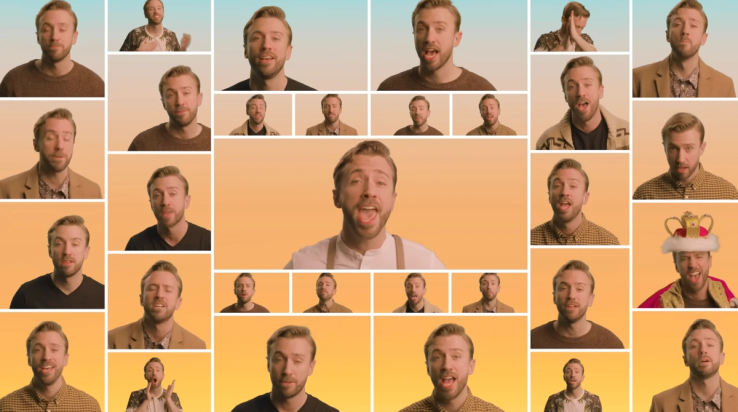The News
The AI rush is turning Peter Hollens’ decade-old a cappella YouTube videos into a new gold mine, with companies paying thousands to license his content to train video generation models.
Hollens, who now oversees a variety of creator-focused startups and still occasionally posts a cappella videos, has made $33,000 in the last year just from licensing a thousand hours of old videos for training purposes. He makes more than $33 per hour of content used by an AI company, and has 1,400 hours of available videos that can be sold multiple times over to various companies. It will be one of his top sources of income this year, with a higher payout than advertising revenue from YouTube, he said.
“Your worst takes are worth just the same as the best thing you’ve ever shot,” said Hollens, who heard about licensing his video archive through a friend. “Go take your money, girl.”
Texas-based startup Troveo manages the process, labeling creator videos and licensing them to AI companies. Tech firms need huge volumes of video and audio content to feed into their models so they can accurately generate movement, sound, human expression, and other real-world behaviors. Social media creators, in particular, represent a treasure trove for AI companies thanks to their vast archives of video content, both published and unpublished.
The trend comes as many artists, authors, and musicians have been critical of how AI companies train models based on their work. Last month, Anthropic agreed to pay $1.5 billion to 500,000 authors who claim their books were used to train its AI. But training deals are an emerging economic opportunity. Arrangements like Hollens’ represent a shift towards collaboration — creators choosing to engage with the AI industry on their own terms.
“We need to grab as much value as possible from these people that are going to have the reins of superintelligence,” Hollens told Semafor. “Right now, they need the data.”
In this article:
Know More
Troveo is one of a handful of companies working directly with creators to compensate them for licensing their videos. These content delivery middlemen, plus the tech companies themselves, are increasingly reaching out directly to individuals for their years of lengthy videos. Brody Boutcher, who posts animation content to 2.5 million followers, told Semafor that AI companies reach out to him at least once a week.
The partnership is moving the needle in big ways for some. Troveo has paid a handful of creators more than $1 million each for their content, licensed from Big Tech companies and well-funded AI startups, according to CEO Marty Pesis.
“A lot of these companies are scraping publicly available content,” Pesis said. “Leaning in and being part of the deals allows you to dictate terms and be a little more in control of how your data is being used.”
Kameron Buckner, who posts legal tips and entrepreneurship content, signed up with Troveo in June. While she hasn’t made any money from her videos yet, she said she is hoping her content can promote Black representation in AI.
YouTube has launched its own service connecting creators with AI companies. Users can click a button on their profile to indicate they’re open to their videos being used for training, and AI companies can then reach out directly to negotiate terms. Meanwhile, Google uses videos from its YouTube subsidiary to train its industry-leading Veo 3 model — something creators don’t directly get paid for and can’t opt out of.

“We’ve seen strong interest from a diverse range of creators,” said Jack Malon, a YouTube spokesperson, though he declined to provide specific numbers. “We think AI represents a new economic frontier for creators, but only if they’re in the driver’s seat.”
Several creators told Semafor they aren’t opposed to opting in, but YouTube’s messaging makes it unclear what that entails. Morgan Gold, who posts about living on a farm, said he’s open to using YouTube’s service but sees no immediate incentive — no boost in visibility or guaranteed payment.
Step Back
For some creators with big platforms and high revenue, initiatives like this are “a distraction,” said Reed Duchscher, talent manager and CEO of Night Media and former manager of YouTube megastar MrBeast.
“YouTube rolls out a lot of stuff like this hoping creators will onboard into it. It’s really hard to get creators to do anything in the studio except upload videos,” he told Semafor. “If you’re making more than $500,000 gross revenue per year, you no longer care about stuff like this.”
Of the roughly 50 creators and managers under Night Media’s brand that Duchscher spoke with about YouTube’s opt-in feature, no one was interested, he said. Separately, he has negotiated about five Troveo deals for terabytes of video content, each worth “tens of thousands of dollars,” he said.
Room for Disagreement
Some creators want no part in training AI, uneasy about its broader implications. “Money would not be worth the potential downsides or fallout,” said Miranda Webster, who creates hiking and camping content.
“If someone were to offer me several thousand dollars to show my videos to a guiding company, I would be like, ‘hell yeah.’ As far as training a computer goes, my feelings on AI are too complicated for me to feel comfortable with that.”
Notable
- Hundreds of thousands of videos were scraped from news organizations’ YouTube channels — including The New York Times, Vox, ABC, and Fox — and appear in AI training datasets, an investigation from The Atlantic found.
- Similar efforts to pay creatives for licensing their work are emerging in other industries, with startup Created by Humans doing the same for authors.


